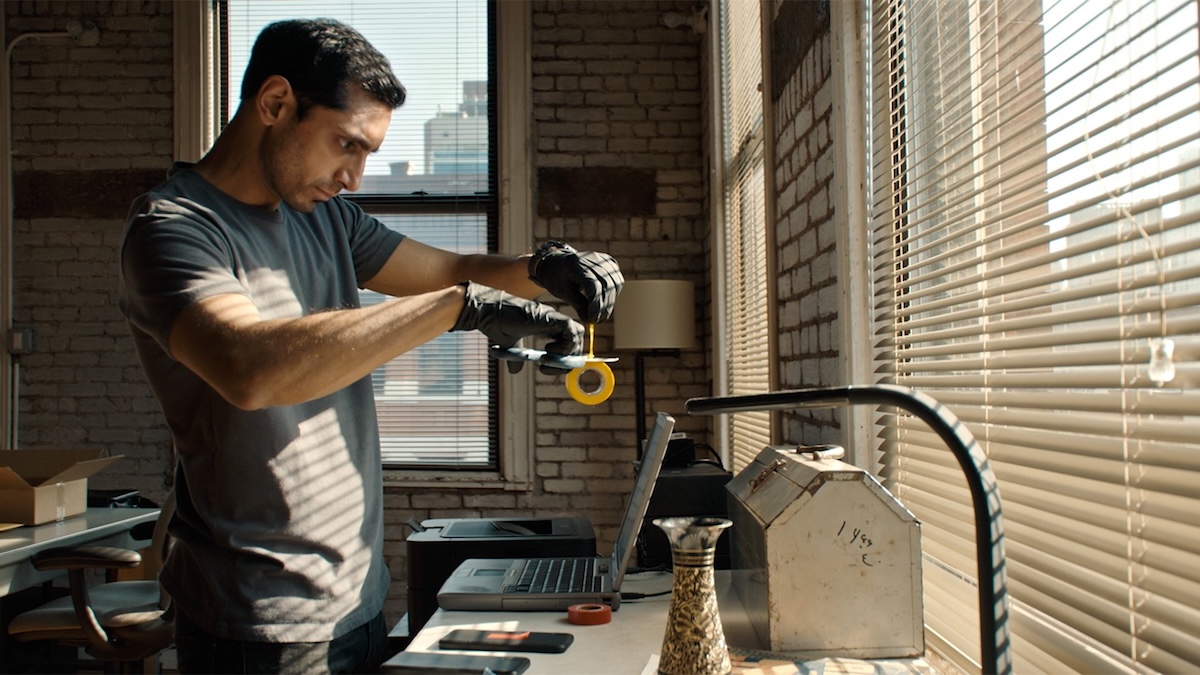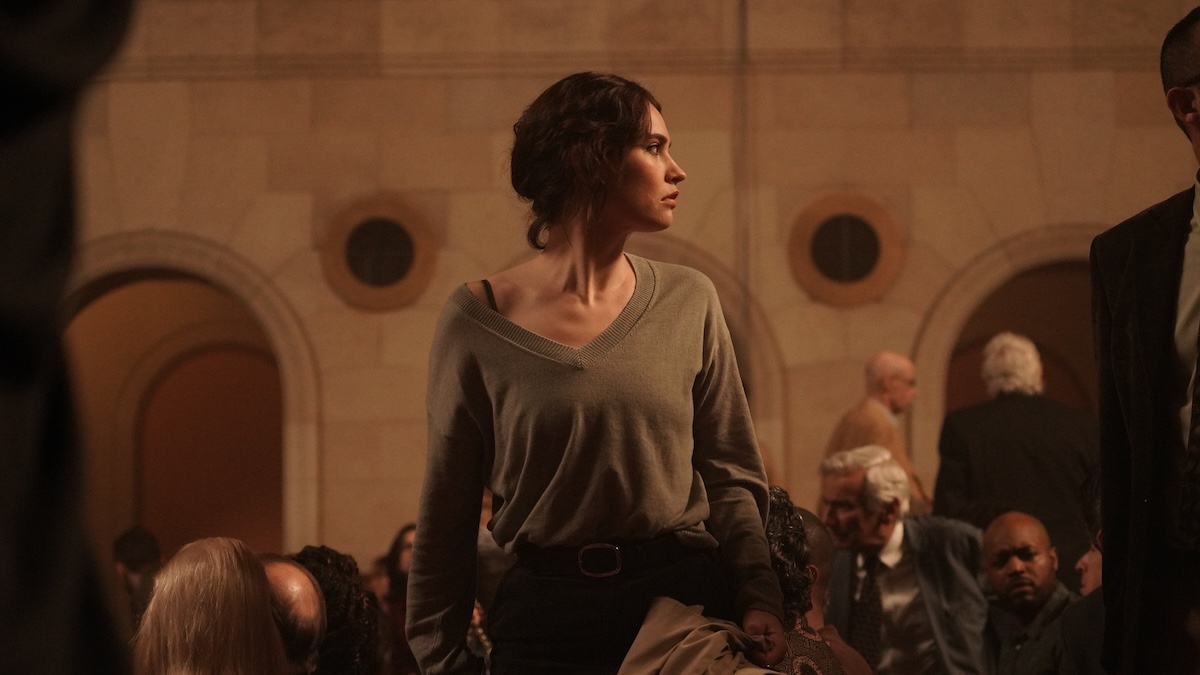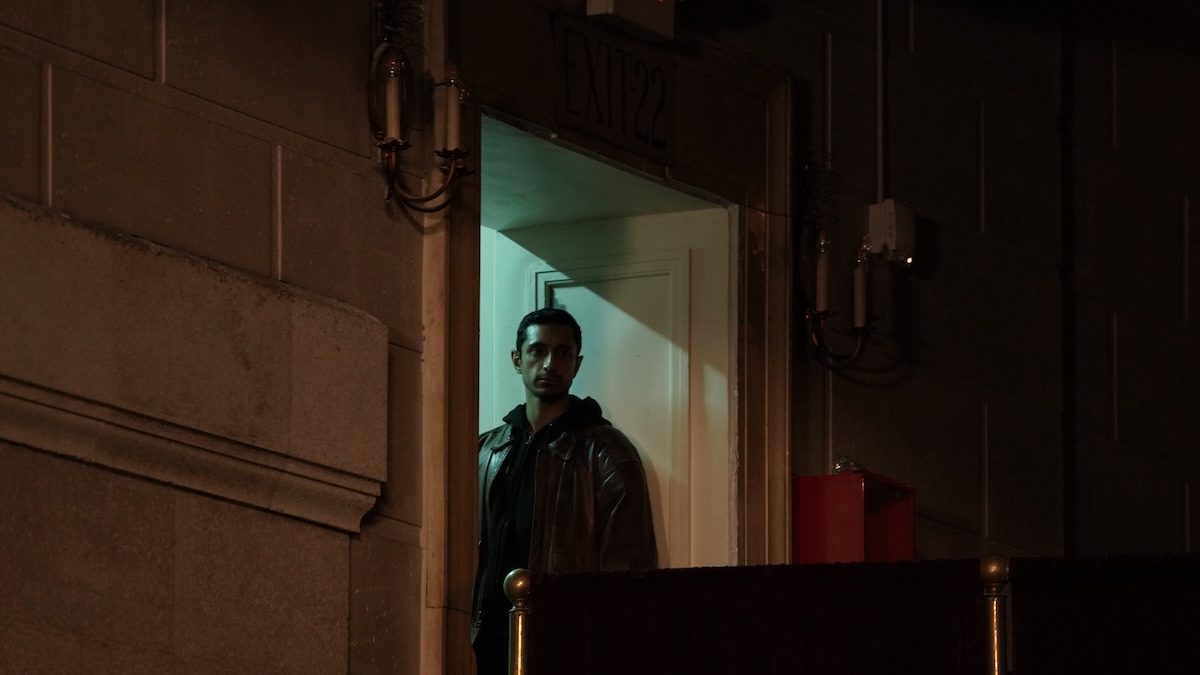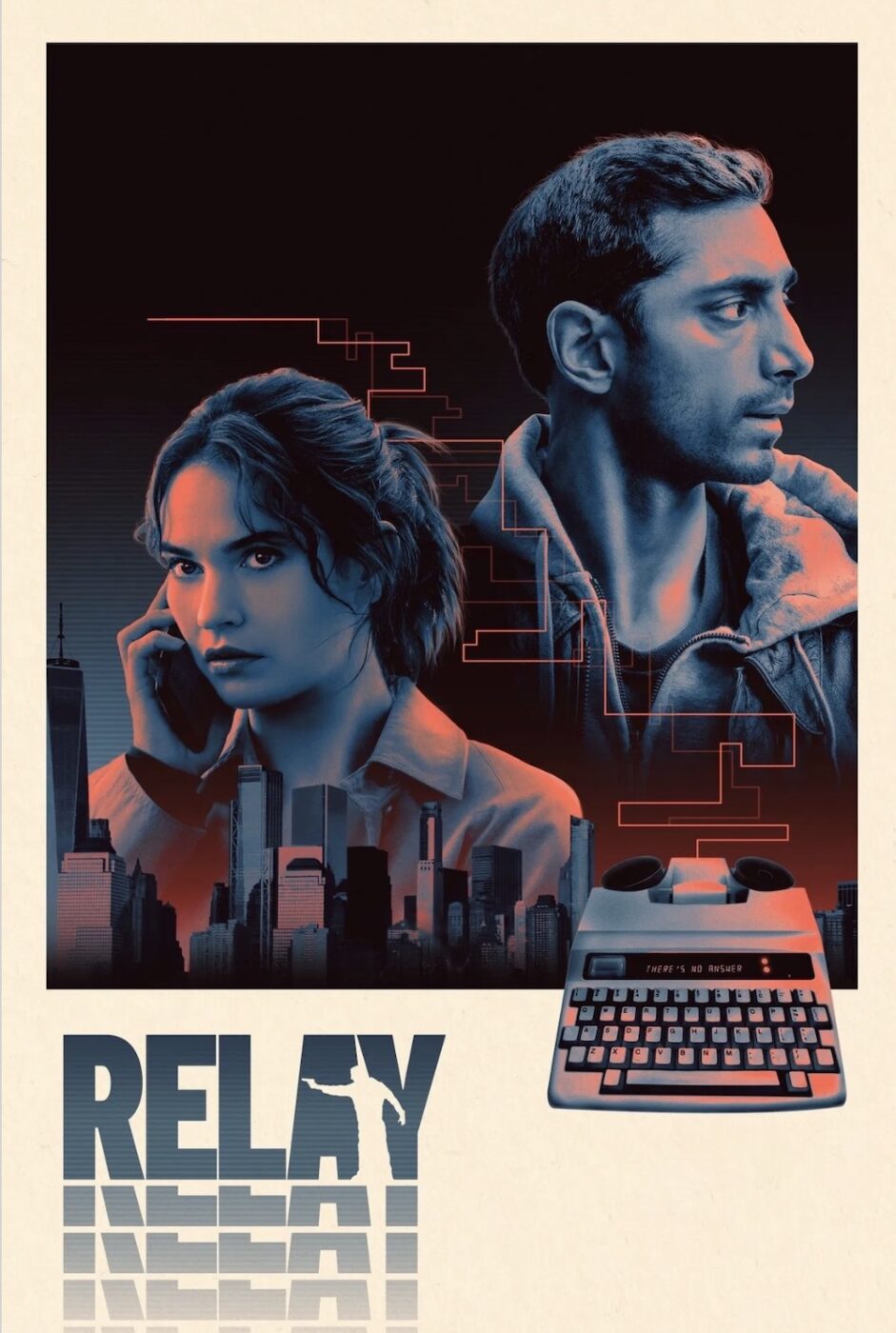RELAY (2024)
A broker of lucrative payoffs between corrupt corporations and the individuals who threaten them breaks his own rules when a new client seeks his protection to stay alive.

A broker of lucrative payoffs between corrupt corporations and the individuals who threaten them breaks his own rules when a new client seeks his protection to stay alive.

A lonely fixer falls for a helpless whistle-blower via a New York City relay service in this surprisingly tense thriller. In Relay, director David Mackenzie (Hell or High Water) transforms a simple means of communicating into an elaborate system used to plan, deceive and even flirt. What begins as a cleanly executed exchange of information becomes an intricate race to stay ahead of the opposition.
The story follows Tom (Riz Ahmed), a mysterious middleman who uses a relay phone system to broker deals between corporate whistle-blowers and the powerful companies trying to silence them. His newest client, who has stumbled across his services almost by accident, is Sarah (Lily James), a former employee of a bio-engineering firm who has uncovered deadly side effects in a product that could collapse the company just days before it’s sold to a larger conglomerate. When we first meet Sarah, she nervously makes her way to a lawyer’s office to plead her case and beg for a way to negotiate a truce. The lawyer refuses but gives her a number that leads her to Tom.
From this first scene, Mackenzie lays the framework for an intelligent drama that requires attention to detail well beyond a formulaic thriller. The plot itself might be simple enough: Sarah has documents that belong to the company, and they want them back. She wants to return them in exchange for her safety, and Tom is there to facilitate the exchange. The complexity lies in his method—a process both intricate and carefully orchestrated, wrapped in a thick layer of paranoia. His first step is to see exactly what they’re dealing with. Unbeknown to Sarah, he joins her on the ground and draws out each of her pursuers. The more that appear, the more we wonder whether Tom is there to get paid, pursue companionship or simply relish the challenge.

The most unique and interesting part of the puzzle is the use of the relay service. These are telecommunication systems used by people who are deaf, hard of hearing or have speech impairments. Tom is none of those, but instead uses the service as a third party to communicate while remaining completely anonymous. Each time the service is used, there’s usually a cut-away shot showing a dramatisation of the call centre relaying each urgent message. And each time, one might wonder if this is really how these services operate—but that’s a detail that’s easy to overlook.
For nearly 45 minutes, Tom doesn’t speak. He types, listens, observes and reacts, but says nothing. This silence defines him for the establishing portion of the film. Mackenzie turns that absence of dialogue into suspense, letting the audience project intentions onto Ahmed’s stoic face. The lack of dialogue is by design: it forces the viewer to watch how Tom works and to understand him through movement instead of exposition. When he finally speaks, it’s jarring—proof of how effective the restraint has been.
As the middleman, Tom orchestrates settlements between whistle-blowers and corporations: the exchange of evidence for money, the promise of silence for survival. It’s a morally grey profession that depends entirely on his wisdom and strict adherence to procedure. What makes Relay fascinating is how that procedure starts to break down—not through incompetence, but through the raw, human side of Tom that is desperate for a break.

Sarah is introduced as a figure of fragile composure. Lily James gives one of her most nuanced performances, perfectly portraying each of Sarah’s emotions: fear, guilt and an almost naïve hope that logic will prevail. She’s not glamorous, nor should she be. She’s a scientist who’s seen too much. The way James plays her early scenes—shoulders hunched, voice barely steady—suggests someone who has spent too long playing an unwinnable game.
Her first conversation with Tom, filtered through the relay operators, is both awkward and strangely intimate. She’sreaching for help and he’s doing his job. The dialogue is transactional, but there’s something about it that feels personal. Mackenzie never forces the connection, allowing it to grow slowly over the course of the scheme. It’s a strange position the audience finds itself in. For everything to go smoothly, they must never meet—but audiences are conditioned to know better. There’d be no conflict if everything went according to plan. When everything on screen is going according to plan, a growing sense of dread develops. It’s subtly and intentionally woven in—and impressively so.
James is exceptional at sustaining this contradiction. Her Sarah is intelligent enough to understand the stakes but vulnerable enough to hope they don’t apply to her. Every time she steps outside, the film’s tone tightens. When she moves between flats, looking over her shoulder, Mackenzie captures the specific loneliness of being hunted in a city too crowded to care.

Opposite Tom and Sarah is Dawson (Sam Worthington), leader of the team of henchmen acting on behalf of the corporation trying to neutralise the threat by any means necessary. Worthington (Avatar: The Way of Water) is consistently menacing in the role of the antagonist. He often plays stoic figures, but here he channels that blankness into menace. Dawson is pragmatic evil—not fuelled by ideology or revenge; he’s simply efficient.
Dawson’s pursuit provides the film’s physical movement. As Sarah and Tom manoeuvre through their invisible transaction, Dawson closes in, unravelling the system piece by piece. These cat-and-mouse sequences are staged with subtle intensity. Mackenzie knows the threat of capture is more compelling than the act itself. For most of the film, the tension builds without any wild chase scenes or shoot-outs. This is when it’s at its best. Unfortunately, it chooses not to keep that momentum.
For two acts, the result is mesmerising. Relay operates like clockwork, its mechanics visible but elegant. It’s a thriller that trusts its audience. Then comes the third act. Without detailing specifics, the film pivots from measured procedural to conventional action film. What had been a study of systems and isolation becomes a story of revelation and confrontation. The tonal shift isn’t disastrous, but it betrays the discipline that made the film special.

Mackenzie’s visual control remains intact—the frames are composed and the pacing steady—but the story feels as though it’s trying to escape itself. Even when the narrative loses coherence, the craftsmanship remains. The tension and suspense that were present throughout might appear differently, but they remain constant until the final frame.
At its core, Relay is about people defined by their individual roles. Tom is the fixer, Sarah the whistle-blower, Dawson the enforcer. Each has traded a sense of self for a sense of purpose. Mackenzie suggests that in a world governed by transaction, humanity is a liability. The relay service embodies that idea perfectly: technology designed to connect people now exists to keep them apart.
For a period of time, Relay is one of the most impressive thrillers in recent memory. It’s intense, original and almost overly confident. Mackenzie builds suspense out of silence and process, trusting the audience to follow the logic of his design. Ahmed and James give performances of rare control, letting their emotion and expressions do the work. Worthington has less screen time, but his potent turn adds a heaviness to the tone.
Then the film stumbles. Its closing stretch trades restraint for conventional resolution, and the careful architecture buckles under the pressure of narrative obligation. What began as a near-perfect exercise in tension concludes as a reminder of how fragile tension really is.
Even so, Relay remains a film of striking precision and purpose, anchored by commanding performances and a premise that feels genuinely new. It doesn’t end as strongly as it begins, but for most of its run time it’s impossible to look away.
USA | 2024 | 112 MINUTES | 2.39:1 | COLOUR | ENGLISH


director: David Mackenzie.
writer: Justin Piasecki.
starring: Riz Ahmed, Lily James, Sam Worthington, Willa Fitzgerald, Jared Abrahamson, Pun Bandhu & Eisa Davis.
